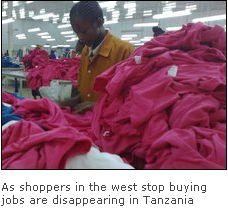
Ajay Shah is a worried man as Sunflag Textiles, the company he runs in Arusha, northern Tanzania, has experienced a huge fall in orders.
This is a knock-on effect of the global credit crunch and the recession in Sunflag's main markets - Europe and the United States.
"The buyers in the US and Europe have stopped buying. They are not able to place any more orders… at this moment we are dry of orders," he tells me.
Sunflag makes clothes, such as T-shirts and dresses, and also produces lengths of material for stores and individual labels in rich, developed countries.
Unlike many firms that make garments, this factory, a few kilometres from the centre of Arusha, starts with the raw cotton and then ships out a finished product, rather than specialising in one particular part of production.
Downsizing
Vijay Dhavale, the plant's technical manager, shows me around the sprawling, dusty plant and explains the process from start to finish.
Bales of raw cotton are being tossed in the air.
They have been transported here to Arusha from farms in the west of Tanzania.
The cotton is then treated by workers in protective face masks before it is spun on large machines into thread.
Balls of brightly coloured thread - pink, blue, yellow - fill racks in the factory, waiting to be woven into fabric.
When I visit the plant, workers are cutting pink cloth and stitching various pieces together to make t-shirts.
They look busy, but they tell me things are not like they used to be.
As consumers in developed countries cut back on the amount they spend on clothes, producers like Sunflag are feeling the pinch.
Executive Director Ajay Shah, says the volume of garments his factory is making has fallen by an average of 30% in the four months up to March 2009.
Wearing a brown T-shirt made on his 32-acre site, he says the effect on the company is clear: "It has left us with no option but to downsize."
Bleak outlook
Sunflag Textiles employs 2,100 people.
Until recently staff worked a shift pattern that kept the factory operating 24 hours a day, seven days a week.
Now the site is only open five and a half days a week.
To the relief of workers, that has not meant a cut in their pay. But Mr Shah warns this cannot continue indefinitely.
He says if things do not improve by May, he will have to start reducing the number of staff.
Unemployment
Apart from the obvious effect on employees and their families, it will also be a blow to the group of people gathered outside the factory's tall, metal gates.
The men and women, and some children too, are sitting in the shade of a large tree to stay out of the hot sunlight.
They say they are hoping someone from Sunflag will come out and offer them work, even though the firm says it is no longer recruiting.
One of those waiting, 21-year-old Eric Patrick, explains: "So many people are looking for jobs, but there's a problem getting work. It is very difficult".
He says finding paid employment is getting harder.
The 30 or so people with him seem to agree.
Tanzania has had years of above-average economic growth compared to the rest of sub-Saharan Africa.
But the chill wind of the global downturn is beginning to batter its businesses.
It is no wonder Ajay Shah is concerned.
"With the downturn, everything is looking bleak".





